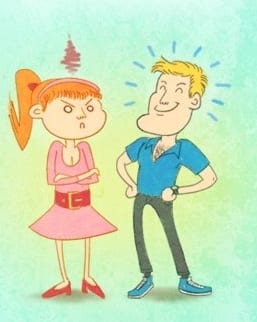OREM — I’ve said before that I’ll never pass up a chance to see a Grassroots Shakespeare Company show, and my enthusiasm only grew stronger after seeing their production of The Taming of the Shrew Monday night. GSC’s productions are staged under conditions as similar to Shakespeare’s time as the company can muster, which generally means outdoors, with no director, minimal props, and makeshift costumes. In this case, going Shakespearean also meant an all-male cast. To top it off, the play was accompanied by one anachronistic accordion. And since my love for accordions is rivaled only by my love for men in drag, the evening started off on the right foot.

As the play commenced, I was a bit ashamed to realize that I’d never actually seen or read The Taming of the Shrew. 10 Things I Hate About You: CHECK. Kiss Me, Kate: CHECK. The original Shakespeare: a big NOPE. So, having only a very rudimentary idea of where the plot was going, I was impressed with how easy the GSC cast made the story to follow. I was even more impressed with the actors’ skill at milking the humor and meaning out of Shakespeare’s dialogue after I learned they’d subtly adapted and combined characters to make the play work for their small cast of seven men.
While GSC boasts creating “productions inspired by Shakespeare’s original staging techniques,” I am always pleased that they don’t limit their humor to the 16th Century. Zachary Tyler Bell’s Baptista was reminiscent of a 19th century southern plantation owner, as he strutted the stage, sporting a white suit and a southern accent and bargaining with potential suitors for the hands of his two daughters.
While every actor had a knack for both verbal and physical comedy. The leading couples—Davey Morrison Dillard and Jason Sullivan, Topher Rasmussen and Robbie X. Pierce—each possessed an odd chemistry which carried their roles safely beyond all-male-cast awkwardness and into the realm of pure humor. Dillard played Katharina “the shrew” as a petulant imp whose wit and tantrums were a pleasure on their own, but whose comic flare shone all the brighter when paired against Sullivan’s booming-voiced lumberjack of a Petruchio. Rasmussen’s gum-chomping valley girl Bianca was delightfully simpering, and her Twilight t-shirt was a stroke of genius. Pierce was her perfect match as the deeply determined, if cloying, Lucentio.
Steven Pond’s Hortensio was as likeable as any romantic rival that ever lived, and—donning a coat and wig—his Vincentio was the confused and vaguely displeased elderly father one can only hope for. And Tyler Harris filled the role of the oft-disguised Tranio with gusto.
While GSC flawlessly executed the evening of light-hearted humor they intended, I was a bit confused by their treatment of the show’s overarching moral theme. Prior to seeing The Taming of the Shrew, I’d only seen shows in which Shakespeare portrayed women simply as people acting within the social confines a patriarchal society. I’ve always enjoyed watching such quick witted female leads as Beatrice from Much Ado About Nothing and Portia from The Merchant of Venice, and, well, I just figured Juliet and Ophelia were dealing with a lot of emotional issues in addition to their unhinged leading men, so I gave them a break. But after this play, I felt like I didn’t even know Shakespeare anymore. Morrison’s Katharina seemed more like a wench than a willful woman with a fiery tongue, and Sullivan’s Petruchio was more a drunken wife beater than a clever challenger. The two of them made the most of Shakespeare’s lack of stage direction by infusing their parts with physical humor, which was always hilarious but sometimes also uncomfortable.
I had a hard time deciphering whether GSC was trying to make light of some unavoidable original Shakespearean message that if a woman is enough of a witch, she deserves to be beaten into submission, or if, on the contrary, Morrison’s Katharina was supposed to be using faux-submission as a tool to get what she wanted. After reading the play and googling a few analyses, I gather that Shakespeare scholars aren’t actually sure what the intent of this play was. (In fact, in the original, the whole play is set up as a “play-within-a-play” performed for a drunken tinker. H.J. Oliver and I would posit that this induction is a cue for the audience to interpret the entire play, including statements about women’s submission, as nothing short of ridiculous.) While there is no consensus on a correct interpretation, I would have found the play more accessible if GSC had made a clear choice about their take on the script, even if that meant tempering a bit of the impishness out of Morrison’s role to make Katharina seem more human.
Even with my confusion about GSC’s intent for the interpretation of this play, I’d like to see this production again. The cast did justice to Shakespeare’s witty dialogue, and their use of audience participation, occasional accordion and flute sound effects, and modern references simply added to the fun.
[box type=”shadow”]The Grassroots Shakespeare Company’s all-male production of The Taming of the Shrew plays at various schools in Salt Lake and Utah Counties through May 23 and at the Moab Arts Festival (375 S. Main Street, Moab) on May 25 and at Liberty Park (600 E. 900 S., Salt Lake City) on June 1 at 6 PM. A full tour schedule is available here. For more information, visit www.grassrootsshakespeare.com.[/box]
[box type=”shadow”]Update: Grassroots will perform all three of their summer productions, Henry IV, Part 1; The Taming of the Shrew; and Much Ado About Nothing July 4-6 at the Castle Amphitheatre in Provo (1300 E. Center Street in Provo, east of the main administration building of the Utah State Hospital). Tickets for all 3 productions are $8-15. For more information, visit www.grassrootsshakespeare.com.[/box]
